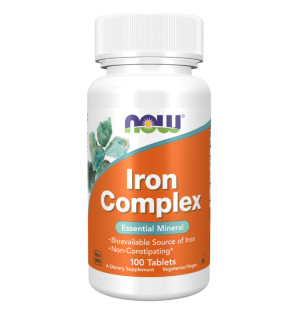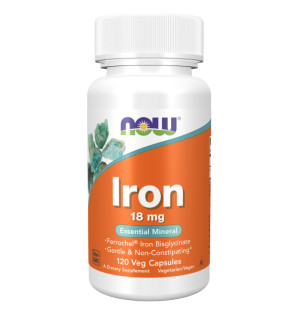Iron
Iron - a key mineral for blood health, energy and the immune system
Iron is one of the most important minerals necessary for the body to function properly. It is a trace element that plays a key role in the production of haemoglobin, a protein contained in red blood cells that transports oxygen from the lungs to all cells in the body. Iron also supports immune system function, aids metabolic processes and plays an important role in energy production.
Iron deficiency is one of the most common nutritional deficiencies worldwide and its effects can be severe, leading to anaemia, weakness, fatigue and many other health problems. Therefore, iron supplementation can be crucial, especially for those at risk of deficiency, such as pregnant women, vegetarians and vegans, physically active people and those with health problems affecting iron absorption.
Main benefits and functions of iron
✅ Haemoglobin production and oxygen transport
-
- The main role of iron is to support the production of haemoglobin, which allows oxygen to be transported from the lungs to the rest of the body. Haemoglobin contains iron molecules that bind oxygen, allowing it to be efficiently distributed to the body's cells, where it is needed for energy production. Without sufficient iron, the body is unable to produce enough red blood cells, leading to tissue hypoxia, resulting in fatigue, weakness and anaemia.
✅ Support of the immune system
-
- Iron also plays an important role in the functioning of the immune system. It supports the activity of immune cells, such as lymphocytes and macrophages, which fight infections. Iron deficiency can weaken the immune response, leading to an increased risk of infection and slower recovery from illness. Therefore, adequate iron levels are key to maintaining a strong immune system.
✅ Energy production and support of metabolic processes
-
- Iron is essential for many enzymes involved in energy production at the cellular level. It is involved in the conversion of nutrients from food into energy that the body can use to perform daily functions. Iron deficiency leads to reduced energy levels, which can manifest as chronic fatigue, lack of motivation and reduced physical and mental performance.
✅ Health and cognitive functions
-
- Adequate iron levels are crucial for cognitive functions such as memory, concentration and the ability to learn. Iron supports the proper functioning of neurotransmitters in the brain, which are responsible for transmitting information between nerve cells. Iron deficiency, especially in children, can lead to problems with concentration, reduced academic performance and problems with intellectual development.
✅ Supporting the health of pregnant women
-
- The need for iron increases during pregnancy, as the mother's body needs to supply oxygen to both herself and the developing foetus. Iron is essential for the production of the extra blood that circulates between mother and baby. Iron deficiency during pregnancy can lead to anaemia, increased risk of premature birth and low birth weight of the newborn. Therefore, iron supplementation is often recommended for pregnant women to support healthy foetal development.
✅ Support for physically active people
-
- People who regularly participate in sport, especially endurance athletes, have an increased need for iron, as there is a greater loss of iron during exercise, both through sweat and muscle micro-injuries. Iron supplementation can help to improve performance, reduce fatigue and support recovery after intense exercise.
Types of iron in supplements
🟧 Haem and non-haem iron
-
- Haem iron comes from animal products (such as meat, poultry and fish) and is more easily absorbed by the body. Supplements containing haem iron are effective in correcting iron deficiencies.
- Non-heme iron comes from plant foods (such as leafy vegetables, seeds and legumes) and is more difficult to absorb. To increase its absorption, it is worth combining it with foods rich in vitamin C, which significantly increases the absorption of non-haem iron.
🟧 Fe rrous gluconate, ferrous sulphate, ferrous fumarate
-
- Iron Gluconate: This is a form of iron that is gentler on the stomach, yet well absorbed by the body. It is suitable for people who have a sensitive digestive system.
- Iron sulphate: This is one of the most common forms of iron in supplements, with high bioavailability. However, it can cause some side effects such as constipation or stomach discomfort, especially at higher doses.
- Iron fumarate: This form is highly concentrated, meaning that it contains a higher amount of iron per dose. It is well tolerated by many people and is often used to treat anaemia.
🟧 Chelated iron
-
- Chelated iron (e.g. iron bisglycinate): is a form of iron in which the mineral is bound to amino acids, which improves its absorption and reduces the risk of stomach discomfort. Chelated forms of iron are often preferred by people who have problems with iron absorption or experience side effects with traditional forms of supplements.
Symptoms of iron deficiency
- Chronic fatigue and weakness: People with iron deficiency often experience fatigue, lack of energy and difficulty performing daily tasks.
- Pallor of the skin: Pallor, especially on the face, inside of the hands and mucous membranes, can be a sign of iron deficiency.
- Dizziness and headaches: Iron deficiency can lead to problems with oxygenation of the brain, resulting in dizziness and frequent headaches.
- Rapid heart rate and shortness of breath: The body tries to compensate for the lack of oxygen by speeding up the heart rate, which can lead to a feeling of palpitations and breathlessness, even with little effort.
- Brittle nails and hair: Weakened hair and nail structure is often a symptom of iron deficiency, which can lead to brittle and fragile hair.
Who should consider iron supplementation?
❎ Pregnant and breastfeeding women: Pregnant women need more iron to support fetal development and the production of extra blood. Iron supplementation can help prevent pregnancy anaemia.
❎ Vegetarians and vegans: Plant-derived (non-haemic) iron is less bioavailable, so people on a plant-based diet may be more likely to be deficient and may need additional supplementation.
❎ People with anaemia: Iron supplements are often prescribed to people with iron deficiency anaemia to correct deficiencies and improve health.
❎ Physically active people: Athletes, especially women, may have an increased need for iron due to intense physical activity, which leads to iron loss through sweat and micro-injuries.
❎ People with absorption problems: People with intestinal diseases such as coeliac disease or Crohn's disease may have difficulty absorbing iron and may require supplementation.
Summary
Iron is a key mineral that supports red blood cell production, oxygen transport, metabolic function and immunity. Iron deficiency can lead to fatigue, weakness, anaemia and many other health problems. Iron supplementation is particularly important for those at risk of deficiency, such as pregnant women, vegetarians, people with anaemia and athletes. Various forms of iron are available and can be tailored to individual needs to support health and improve wellbeing.



